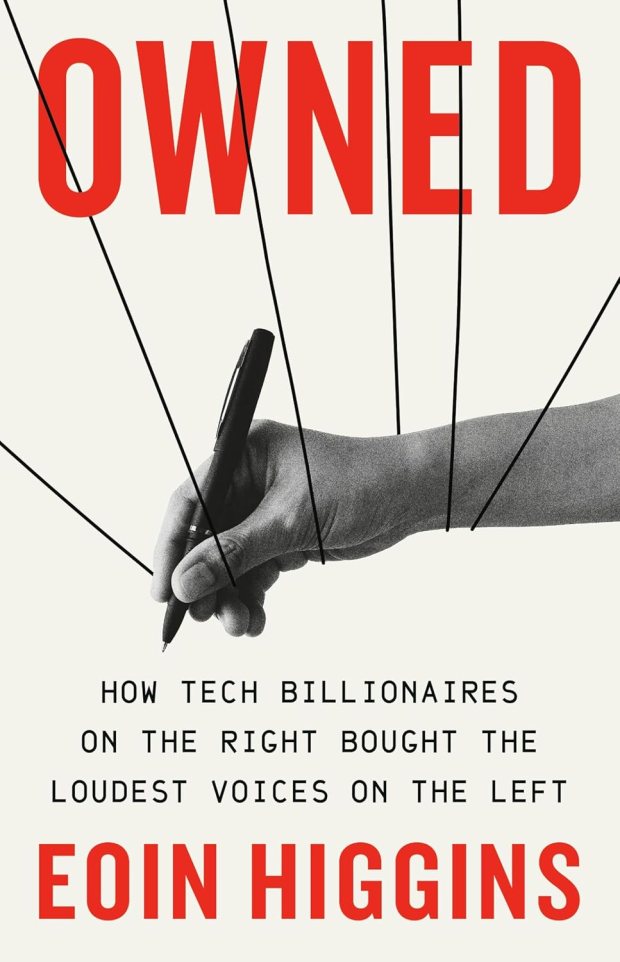It’s hard to know who to trust these days.
Our media is fractured, long past the days of trusted, broadly accessed news sources. Information crops up on social media decontextualized and severed from its origins or even from a coherent chronology.
Artificial intelligence can be used to spoof voices, images and even video, so we literally cannot believe what we see with our own eyes if we encounter it online.
Historically, one of the sources that, at least in theory, could fill this void is individual, trusted voices, journalists and commentators who have built up a track record of rigor and fairness.
A new book by Eoin Higgins, “Owned: How Tech Billionaires on the Right Bought the Loudest Voices on the Left,” now throws even this last proposition into question, at least for a couple of very prominent, longstanding public voices, Matt Taibbi and Glenn Greenwald.
Greenwald first made his name writing for Salon and then The Guardian before co-founding The Intercept as a publication focused on countering government surveillance and interference with individual rights. He presented himself as a champion of those without access to power.
Taibbi is most known for his time at Rolling Stone, where he frequently and scabrously attacked the financial industry, including characterizing Goldman Sachs in a 2009 article as a “great vampire squid wrapped around the face of humanity, relentlessly jamming its blood funnel into anything that smells like money.”
Higgins’ book traces the evolution of these two figures, as well as the media landscape in general as institutions have declined, only to be replaced by billionaires who use their wealth to control what we see, hear and believe.
The title and my description make it sound conspiratorial or polemical, but Higgins’ treatment of the subject is scrupulously fair throughout, mapping the long trajectories of the main figures, including tech barons Marc Andreessen and Peter Thiel, as the intersection of money and the rise of the social internet created different incentive structures around what information to share and how.
We’ve arrived in a place where, once having excoriated Goldman Sachs, Matt Taibbi became one of the handpicked conveyors of the richest man alive’s (Elon Musk) so-called “Twitter files.” Greenwald has gone from leftist firebrand to a favorite of right-wing media and serial apologist for Donald Trump. It’s certainly possible that these changes of viewpoint are sincere, the byproduct of lived experience, but it’s hard to turn away from the influence of Andreessen, Thiel and others in using their wealth to control the dissemination of what gets into the world for others to experience.
Not all the examples are as obvious as Thiel’s famous bankrolling of Hulk Hogan’s lawsuit, which bankrupted the Gawker website, settling a longstanding grudge against the site. But the message becomes clear: The foundation of a journalistic ecosystem predicated on public support in the interests of a public good has been significantly subsumed by the interests of the ultra-wealthy.
Parts were an uncomfortable read for me. Higgins discusses the development and implications of the Substack platform, where I maintain my newsletter, The Biblioracle Recommends, and how this platform, significantly funded by Andreessen, has provided a home to content (science denial, open Nazism) that would never find purchase in a place like this newspaper.
Does this make me at least a little complicit? Maybe, but it’s also one of the few remaining places a writer can go to make additional income.
Higgins is clear, the challenge isn’t just a few billionaires, but a world significantly unmoored from the institutions that once helped hold us together.
John Warner is the author of books including “More Than Words: How to Think About Writing in the Age of AI.” You can find him at biblioracle.com.
Book recommendations from the Biblioracle
John Warner tells you what to read based on the last five books you’ve read.
1. “Bertie’s Guide to Life and Mothers” by Alexander McCall Smith
2. “A Tale of Two Cities” by Charles Dickens
3. “The Killer Angels: A Novel of the Civil War” by Michael Shaara
4. “The Man Who Died Twice” by Richard Osman
5. “Vigilance: The Life of William Still, Father of the Underground Railroad” by Andrew K. Diemer
— Ron L., Naperville
For Ron, I’m recommending a contemporary classic of small-town life, “Empire Falls” by Richard Russo.
1. “Wonder Boys” by Michael Chabon
2. “Everyone Knows You Go Home” by Natalia Sylvester
3. “Empire of Pain” by Patrick Radden Keefe
4. “Small Things Like These” by Claire Keegan
5. “And Then There Were None” by Agatha Christie
— Lisa K., Highland Park
This is not an emotionally easy read, but I think Lisa doesn’t mind a story that gets to the marrow, “The Free” by Willy Vlautin.
1. “Pride and Prejudice” by Jane Austen
2. “Led Zeppelin: The Biography” by Bob Spitz
3. “Presumed Guilty” by Scott Turow
4. “James” by Percival Everett
5. “Miracle Creek” by Angie Kim
— Michael R., Western Springs
I’m chuckling to myself about the juxtaposition of the first two books in this list. Inspired by it, I’m recommending a strange and interesting rock and roll novel, “Great Jones Street” by Don DeLillo.
Get a reading from the Biblioracle
Send a list of the last five books you’ve read and your hometown to biblioracle@gmail.com.





